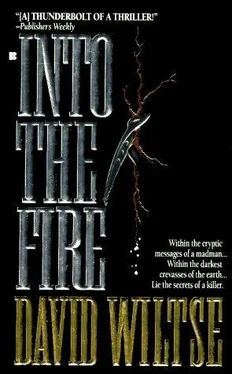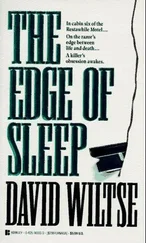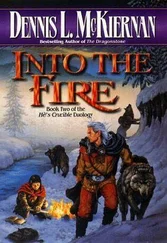David Wiltse - Into The Fire
Здесь есть возможность читать онлайн «David Wiltse - Into The Fire» весь текст электронной книги совершенно бесплатно (целиком полную версию без сокращений). В некоторых случаях можно слушать аудио, скачать через торрент в формате fb2 и присутствует краткое содержание. Жанр: Триллер, на английском языке. Описание произведения, (предисловие) а так же отзывы посетителей доступны на портале библиотеки ЛибКат.
- Название:Into The Fire
- Автор:
- Жанр:
- Год:неизвестен
- ISBN:нет данных
- Рейтинг книги:5 / 5. Голосов: 1
-
Избранное:Добавить в избранное
- Отзывы:
-
Ваша оценка:
- 100
- 1
- 2
- 3
- 4
- 5
Into The Fire: краткое содержание, описание и аннотация
Предлагаем к чтению аннотацию, описание, краткое содержание или предисловие (зависит от того, что написал сам автор книги «Into The Fire»). Если вы не нашли необходимую информацию о книге — напишите в комментариях, мы постараемся отыскать её.
Into The Fire — читать онлайн бесплатно полную книгу (весь текст) целиком
Ниже представлен текст книги, разбитый по страницам. Система сохранения места последней прочитанной страницы, позволяет с удобством читать онлайн бесплатно книгу «Into The Fire», без необходимости каждый раз заново искать на чём Вы остановились. Поставьте закладку, и сможете в любой момент перейти на страницу, на которой закончили чтение.
Интервал:
Закладка:
"Not really," she said. "I know that it troubles you."
He looked at her searchingly for a second. He never pressed her on the subject. Becker knew what he knew but respected her desire to forget. He wished that he could do the same.
"Yes. It 'troubles' me."
"You're out of it, John. Stay out if that's what you want."
"I kept solving the puzzles of the letters, didn't I? I knew it was trouble from the first, but I kept solving them.
Maybe it's what I want to do."
"They're just letters-you didn't solicit them-they aren't forcing you to get involved."
"I know."
"If there's a problem, let the Bureau handle it."
"They are handling it," he said. "With me."
She stopped massaging his shoulders and slipped her chin to his head, her hands to his chest.
"Just don't do it. Stay out of it. It costs you far too much."
"I need to get into a prison to talk to an inmate," he said. "Can you arrange it for me?"
Karen hesitated. "You can visit without any help."
"I need to be alone with him. We can't do it through Plexiglas with cameras on us and a guard standing ten feet away."
"John..
"I don't want Hatcher involved in this. If he is, I won't go near it.
You have the authority to arrange it."
"John-I can't."
"Does Hatcher have a marker on me?" A marker was a directive that Deputy Director Hatcher was to be informed of any Bureau action involving a subject agent.
"You know this is touchy," Karen said.
"Restricted information, right? Okay, I understand. But it wouldn't be restricted if he didn't have a marker on me, would it? You could answer the question then."
"No comment."
"So I am marked, which means I can't do anything without Hatcher being involved, at least as a silent observer, and since I won't do anything if Hatcher is involved, it means I can't do anything. Great. So I'm off the hook. I'm doing nothing."
He stood and took her in his arms. "I got sausage and mushrooms on the pizza. Okay?"
In Washington, the center of American democracy, a city that thrives on secret meetings and private agendas, a clandestine meeting was held between Congressman Quincy Beggs and FBI Associate Director Thurston Hatcher in the Congressional Office Building. There was no pressing need for the meeting to be a secret save for the natural predilections of both men. Both knew there was a time to go public, a time to share the results of their public-spirited efforts with the public itself, and there was a much longer time to keep quiet about their activities lest the public actually come to expect something from them.
There was no point in sharing things with the populace, both men would argue, until there was actually something to share.
Beggs was a short man, going to fat, which spread un attractively across his neck, crowding his collar and bunching up under his chin. It gave him the look of a man who was unused to shirt and tie, a workingman forced into the suit by the demands of his office. In truth, the Congressman was a lawyer by training, a politician by inclination and ambition, and wore a look of perpetual discomfort only because his neck size continued to expand no matter what size collar he wore. If his spreading girth made him appear to be a man of the people, however, Beggs was astute enough to avoid dieting. His very appearance became a prop in his political act, and he was above all else an actor. In fact, Beggs was never more comfortable than when acting a part in front of large groups of people-unless it was now, when he was acting a part in front of an audience of one.
Associate Director Hatcher was a perfect audience.
Having entered the Bureau during the sartorially impious reign of J.
Edgar Hoover, Hatcher never felt fully dressed without a suit and tie and a crease in his pants leg. He would have appeared as out-of-costume in leisure wear as Richard Nixon. The resemblance, many of those under him would say, did not end there. Hatcher's dissembling of sincerity was particularly awkward, an equal in duplicity, his critics said, to the former President's assertions of honesty. One had to be seriously predisposed to the man or have a vested interest in his success-to believe him. It was part of his skill as a director, and manipulator however, that Hatcher was able to predispose those in all who went against him. He offered them what they wanted and presented it with all the deference of a born sycophant.
"It seems possible, Congressman Beggs," Hatcher was saying, tugging at the crease in his blue serge, "just possible, that I may have a lead in finding the man you are after. Pardon me, I misspoke when I said 'I." I meant we, of course. There are many good men and women involved in all of the work of the Bureau."
"Certainly. Excellent people," Beggs agreed.
"I consider myself just part of the organization."
"You're too modest, Mr. Hatcher. There is no need in this office. Your contributions to the Bureau are well known."
"Well, thank you. I confess that I do have a special interest in this case-because, of course, I am deeply aware of how it affects you personally, Congressman."
"When might you expect some results in this line of investigation, Mr.
Hatcher? Not that I mean to influence your management of the case."
"Of course not… If I supervise the matter directly myself-which of course I intend to do-I should think we might expect some substantial results by summer."
"Early summer or late summer?" Beggs asked. His biennial election was in November.
"That's impossible to predict," said Hatcher. "But naturally I will expedite matters as much as possible. In a case this old, there are always difficulties-but then the satisfaction of a solution is that much greater." 'Indeed it would be. I
think I can safely say that the people of my constituency would be very impressed. As would I, Mr. Hatcher. As would I."
Hatcher smiled demurely and tended to his pants.
It was a perfect Washington deal. No whisper was made of promotion for Hatcher, no mention of Beggs' need for a shot in the arm in the coming election. None was necessary, all was understood. Neither man had any personal feeling for the other at all, but they had just become staunch allies.
Hatcher left the Congressional Office Building feeling very pleased with himself. For him, it was a no-lose situation. If he delivered, then Beggs was in his pocket and deeply in his debt. If Hatcher failed to deliver, it was very likely that Beggs would not be reelected and would no longer be of any consequence to Hatcher anyway. He would then have to curry favor with the new member of the Oversight Committee who replaced Beggs, of course, but with the resources of the investigative arm of the Bureau at his disposal, that was never very difficult.
The only problem that remained was Becker. Becker was always a problem, it was in the man's nature, but it was also equally in his nature to be a solution. Hatcher merely needed to tighten a few screws.
"What you mean you burned him? Like at the stake?"
The questioner was the Deacon of the Apostolics. He sat with his choir in the front row of seats in the tent prior to the Reverend Tommy R.
Walker's Miraculous Faith and Healing Revival in a fallow soybean field just outside of Pikeville, Kentucky. Aural sat perched on the stage in front of the choir, her feet dangling over the stage like a schoolgirl on a wall.
"No, he wasn't a witch," she said. "He was just an ordinary son of a bitch."
Rae tittered and Aural gave her a mildly baleful look.
Once again Rae had revealed something Aural told her in presumed confidence. It wasn't the worst habit in the world since nothing Aural had confided was anything she was particularly trying to keep secret, but it did suggest a certain surprising defect in Rae's character. Aural would never have taken her for a blabbermouth. But then maybe she'd never had as interesting a friend as Aural to blab about before.
Читать дальшеИнтервал:
Закладка:
Похожие книги на «Into The Fire»
Представляем Вашему вниманию похожие книги на «Into The Fire» списком для выбора. Мы отобрали схожую по названию и смыслу литературу в надежде предоставить читателям больше вариантов отыскать новые, интересные, ещё непрочитанные произведения.
Обсуждение, отзывы о книге «Into The Fire» и просто собственные мнения читателей. Оставьте ваши комментарии, напишите, что Вы думаете о произведении, его смысле или главных героях. Укажите что конкретно понравилось, а что нет, и почему Вы так считаете.












